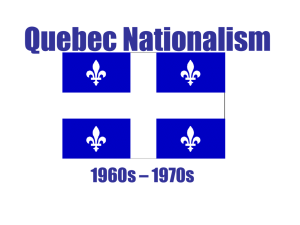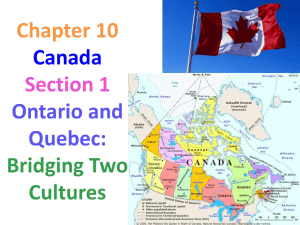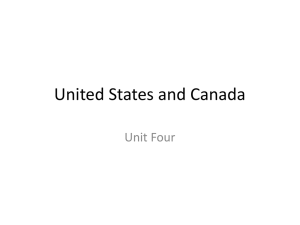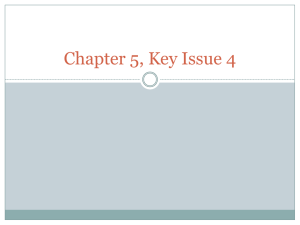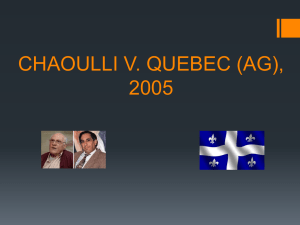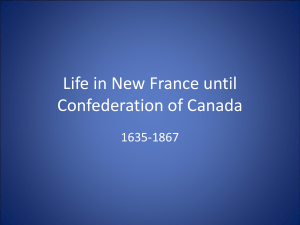A Psychocultural Approach to Quebecois Identity
advertisement
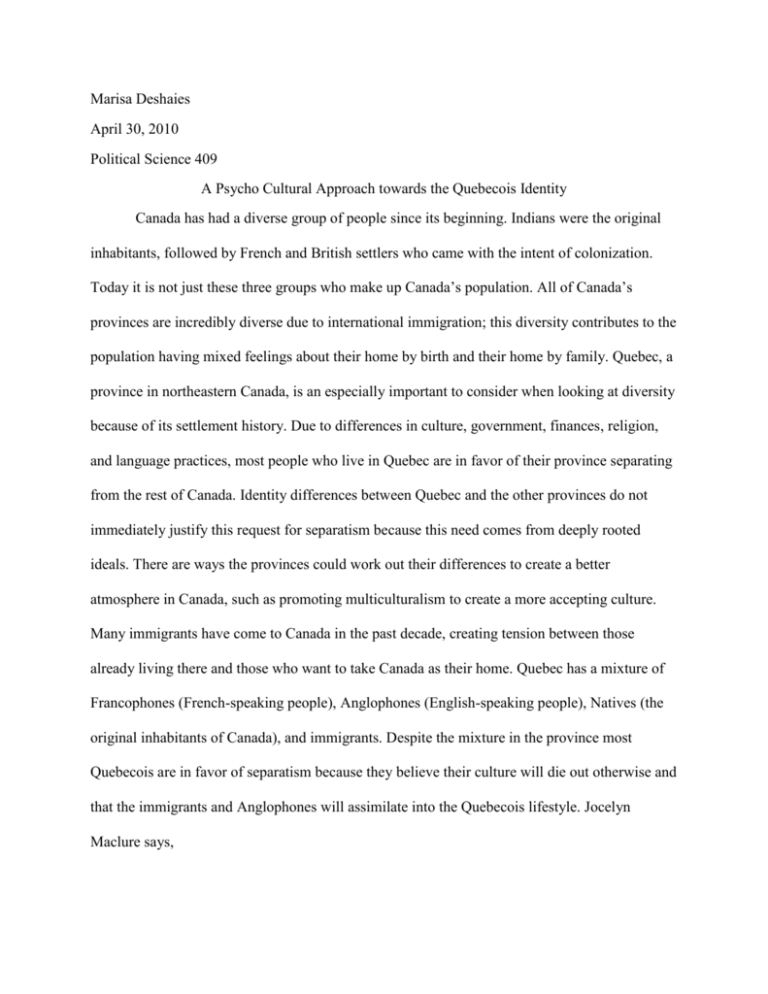
Marisa Deshaies April 30, 2010 Political Science 409 A Psycho Cultural Approach towards the Quebecois Identity Canada has had a diverse group of people since its beginning. Indians were the original inhabitants, followed by French and British settlers who came with the intent of colonization. Today it is not just these three groups who make up Canada’s population. All of Canada’s provinces are incredibly diverse due to international immigration; this diversity contributes to the population having mixed feelings about their home by birth and their home by family. Quebec, a province in northeastern Canada, is an especially important to consider when looking at diversity because of its settlement history. Due to differences in culture, government, finances, religion, and language practices, most people who live in Quebec are in favor of their province separating from the rest of Canada. Identity differences between Quebec and the other provinces do not immediately justify this request for separatism because this need comes from deeply rooted ideals. There are ways the provinces could work out their differences to create a better atmosphere in Canada, such as promoting multiculturalism to create a more accepting culture. Many immigrants have come to Canada in the past decade, creating tension between those already living there and those who want to take Canada as their home. Quebec has a mixture of Francophones (French-speaking people), Anglophones (English-speaking people), Natives (the original inhabitants of Canada), and immigrants. Despite the mixture in the province most Quebecois are in favor of separatism because they believe their culture will die out otherwise and that the immigrants and Anglophones will assimilate into the Quebecois lifestyle. Jocelyn Maclure says, Deshaies 2 … Integration invites people to defend convergent values (such as liberal values and the French language in Quebec) and to recompose the texture and parameters of identity. Difference, whether it be sexual, cultural, linguistic, gender-based, or another kind, is starting to be seen as a wellspring from which identity can draw, instead of a problem it has to solve.” (pg. 137) In order for Quebec to move forward-whether that is in multicultural or separatist waygovernment leaders from Quebec and Ottawa (Canada’s capital city) need to examine why the Quebecois are so afraid that their culture might disappear. Without understanding the Quebecois’ fears no forward action can be taken because one of the largest ethnic groups in Canada will always feel marginalized. One approach to the ethnic conflict between Quebec and Canada’s other nine provinces is based on culture and its impact on people in one particular area. Ross’ psychocultural approach, detailed in Cultural Contestation in Ethnic Conflict, details nine reasons the author feels explain why ethnic conflict occurs. Of the nine reasons he writes about, some of Ross’ ideas pertain directly to the ethnic conflict in Quebec: he claims that ethnic conflict does not always have to be violent and that it is based on culture. In the most basic sense, Quebec’s conflict fits into the psychocultural approach because it has never been violent and at the core it is about different Canadian ethnic groups preserving their cultures. This approach also places a high value on narratives: Ross calls them “collective memories” because they separate groups based on their identities and explain histories in a way that best suits one particular group. Collective memories serve groups in many ways, including identifying the heroes, villains, and values of a particular ethnic group, as well as prescribing behaviors for that group (Ross, pg.33). Quebec’s ethnic conflict does not fit all the requirements for the psychocultural approach but it does come close; Deshaies 3 for a case that is nonviolent, Ross’ approach hits most of the marks that explain why certain ethnic groups in one area can not figure out how to live without fear of losing their identities and accept those who want to make Canada their home. Quebec- or New France as it was called originally-was settled by the French who were interested in producing goods to ship back to their home country. Fur trading was the primary means of support for these settlers and other than that unique knowledge applying to the Canadian landscape the settlers retained their ties to France. The Roman Catholic Church continued to hold an important presence in everyday lives and settlers followed laws that pertained to France. Time progressed and the settlers began to loosen their allegiance to France because they were forming an identity all their own. Their unique knowledge of the Quebec land and their children feeling like Quebec was their home all contributed to the beginning of a Quebecois society. Creating a home in Quebec that was all their own exemplifies the beginning of Quebecois selectivity of their narratives that continues to present day society. Selectivity is important to the psychocultural approach because it focuses only on one side’s interpretation of past events and memories. Ross says, “Because present needs and challenges shape the narratives relevance, specific events in it shift in importance, elaboration, and emotional significance over time,” (pg. 37). The important idea to take out of this quote is how narratives change all the time because the ethnic group is selective about what parts of the narrative will best suit their cause. Nationalism, for example, is the driving force of the separatist movement in Quebec to this day. The Quebecois use selectivity in terms of nationalism to advance their cause because the narratives and emotions they choose to represent their people make them different from individuals in the rest of Canada. The province still retains much of its French history but Quebec is truly a separate entity from its parent nation. While there are monuments replicated in Deshaies 4 Quebec dedicated to their twins across the Atlantic, the Quebecois also speak a dialect of French that francophones would immediately notice as different from the language spoken in Europe and taught in American classrooms. Ross’ point that events shift in significance over time to suit the group’s needs is especially important when examining the Quebec ethnic conflict because it is how an outsider comes to understand the development of the Quebecois identity and the reasons they believe constitute separatism from the rest of Canada. Additionally, Ross’ approach applies to the early creation of Quebec history because of the primordialism concept, which focuses on ethnicity. Primordialism says that a group’s ethnicity has always been within them. This is false statement in terms of the Quebecois because ethnicity is constantly changing due to their perception of the world outside of the province and the perception non-Quebecois people have of them. Quebec’s early history certainly fits into this category since the first Quebecois were French and brought their own traditions and culture to their new home. Ross also says that primordialism is widely believed by group members. The Quebecois created their new culture out of new beliefs founded on a new life in Quebec, along with what they were familiar with from France. These beliefs created new values that all the Quebecois believed because they did not have anything else to follow. Primordialism correctly describes Quebec’s early history because the province’s history was not always in that one place. Rather, it a mix of old and new values and beliefs that helped make Quebec its own entity. Another way to understanding ethnicity that the psychocultural theory explains is that ethnicity is a social construction. Ross says, … while groups see collective memories as unchanging, objective accounts of a group’s history, it is clear that not only are there often major changes in emphasis and the specific Deshaies 5 events or people included in group narratives over several generations but at any one time there is also variation in which memories are most salient across generations.” (pg.35) This is one area where the psychocultural approach to the Quebec ethnic conflict does not match up: the Quebecois, in contrast to this approach, are trying to keep their ethnicity exactly the same as was when Quebec first became a province. Their conservatism and belief in the Roman Catholic religion helped make them who they are today and the Quebecois feel that if they change who they are or allow other ethnic identities to slip into their culture then what makes them Quebecois will disappear. “Our feelings of who we are twine with feelings about our nation, so that when we feel proud of our nation we somehow feel personally proud. When we feel ashamed of our nation, or sorrow for it, the shame or the sorrow hits home,” (Jacobs, pg. 3). This quote from author Jane Jacobs explains how closely tied people are to their nation; although not a tie that most people recognize on a daily basis, when strong emotions surface people come together and act as one body. The Quebecois show that they are a body of people who follow this concept closely in order to keep their culture alive. Ross does allow for a debate of the ease of change within the social construction concept because of situations like Quebec’s. He claims that some identities come and go quickly while others change over time (pg.35). The difference with Quebec’s social construction is that the Quebecois do not want to change at all. They believe that only certain aspects of their culture make them who they are; if they were to change some of their values and beliefs then they will not be ‘Quebecois’ anymore. This way of thinking is what is driving the ethnic conflict to this day because as more and more immigrants are coming into Canada the bigger the threat is to the Quebecois’ identity. A third part of Ross’ psychocultural approach to ethnic conflict is rational instrumentalism, the idea that ethnic groups pick the identity that works the best for the time. Deshaies 6 Rational instrumentalism is a concept that does not apply to the Quebec conflict because the values and beliefs that the Quebecois are trying to keep alive are ones that were original to the French settlers that came over to Canada in the 1600s. The rational instrumental theory can not apply to the ethnic conflict since the Quebecois are holding on to values and beliefs that belong to their ancestors, which means what they believe in is not changing to suit the times. If the Quebec conflict were to apply to rational instrumentalism the Quebecois would have to adopt new policies in order to make a more accepting culture. A task such as supporting multiculturalism, where immigrants and people with heritages other than French are accepted into Quebec’s culture, would better apply to Ross’ approach. The Quebecois would not have to lose their identity to help others assimilate but rather become a more accommodating community in an age where people of all different backgrounds help make up one culture. Additionally, Ross’ theory includes the psychocultural idea that says that what people value is based on their culture. This would certainly apply to the Quebec ethnic conflict because the Quebecois’ most important values are based on ones they brought over from France; conservatism, the Roman Catholic religion, the French language, and French laws partly make up who the Quebecois are today. As the French settlers adjusted to their new home they also constructed values on the ways of life that were suited to the new province. These old and new cultural practices fit into the psychocultural aspect of the psychocultural approach because the Quebecois inherently base their decisions and actions on what they believe are appropriate for Quebec. Nationalism is the driving force of the separatist movement that is pushing Quebec to become its own nation. The Quebecois do acknowledge their Canadian nationality but ultimately they let the world know that they are first and foremost from Quebec. Author Jonathon Lemco says, “The various strains of nationalism in Quebec have produced a situation in which French- Deshaies 7 speaking Canadians are twice as likely to identify themselves as Quebecois than as French Canadians and more than six times as likely to identify themselves as Quebecers than Canadians,” (pg.13). So while the Quebecois can never completely ignore acknowledging the rest of their country, they always make sure that outsiders know that Quebec is their true home. The psychocultural part of the psychocultural theory is a large part of why Quebec is in the state it is in; the Quebecois are afraid to change their values because these values make up the province. If the Quebecois change their values then their entire culture would change as well, leaving them without an identity. The psychocultural dramas of Ross’ theory explain that conflicts occur because both sides fear threats to their identities; these dramas explain Quebec’s ethnic conflict because of the ongoing misunderstanding between the French-Canadians and English-Canadians. The EnglishCanadians are Quebec’s most dangerous enemy; although a small amount of them live in Quebec, it is those who help make up the population of the other nine provinces that are problematic to the Quebecois. Tensions originally arose between these ethnic groups because of the various differences between cultures as the British settled their provinces; they continue today because of feelings of hatred and nervousness about oppression, sovereignty, and diverse ideals. Jacobs writes, “The English were disappointed by the obstinate refusal of the French to give up their language and customs and assimilate into the society of their conquerors, then became exasperated with the French as priest-ridden, tradition-bound, backward, clannish, and occasionally sullen or riotous,” (pg. 8). Her quote exemplifies one of the most important distinctions between the English-Canadians and Quebecois: the English-Canadians value each person’s uniqueness while the French-Canadians are more concerned with preserving their culture as a whole. This particular psychocultural drama displays how the English-Canadians are Deshaies 8 moving with the times while the French-Canadians are trying to hold onto ideas that are keeping them isolated from the rest of the world. English-Canadians want to accept every single person as someone who has unique gifts that can better Canada. Their counterparts in Quebec see their culture as a single individual who must never waver in their beliefs for fear of losing what is most important. A quote from Alain Gagnon and Raffaele Iacovino says, “This approach [multiculturalism] views assimilation or acculturation as a violation of the integrity or dignity of the individual, whose cultural habits should be recognized fully as an integral element of a person’s identity. Any stifling of particular cultural expressions by way of the symbolic construction of a larger socio-cultural identity limits the individual’s capacity for self-realization, thus negating the liberal democratic I deal that individuals, as members of the larger society, be given the means by which to explore their own life changes and directions.” (pg.93) Gagnon and Iacovino’s quote shows how varied the emotions are on both sides of this ethnic conflict: not only are the French-Canadians afraid of losing their identities, but the EnglishCanadians truly believe that any kind of move on the French-Canadians’ parts will end in the dominance of individual Quebecois differences. Ross’ approach to psychocultural dramas from different ethnic groups in a conflict explains Quebec’s situation with the English-speaking provinces because both sides are fighting to preserve their identities. Historical events show that the Quebecois and English-Canadians are willing to stand firm in their beliefs in what actions will best suit their groups and Canada as a whole. The challenge for Canadian government leaders now is, through implementing multiculturalism, to promote many cultures at once while not unintentionally pushing a certain one aside. Deshaies 9 Cultural expressions and rituals make up another part of the psychocultural approach to ethnic conflicts. Ross says that these rituals and expressions strengthen group feelings and emotions evoke images from collective memories. This part of the psychocultural approach definitely applies to the Quebec conflict through the Quebecois need to keep everything as French as possible in their province. The Quebecois’ biggest concern regarding the multiculturalism policy is how they are going to maintain their distinct culture when they are equated with Canada’s other nine provinces. In 1977, as a way to counteract the multiculturalism policy, the sovereigntist political party leading the Quebec government implemented Bill 101. Lemco explains, “It passed legislation mandating that all road and commercial signs would be in French only. Almost all new immigrants to the province were compelled to send their children to French schools. All large companies were required to handle internal correspondence in French. These policies were distasteful to many English- speaking Canadians who resented legislation that substantially restricted their institutions.” (pg.7) Keeping Quebec as so distinct in all they ways that separate the province from the rest of Canada strengthens the Quebecois’ feelings of uniqueness; this is exactly what the Separatists want to happen because then they have a legitimate reason for Quebec to become its own country. The Canadian government is using multiculturalism not to push out practices distinct to Quebec but to display that all cultural practices are important. As soon as the Quebecois understand that their culture can remain prominent if it used by some portion of the population they might be able to live peacefully with other Canadian citizens. Deshaies 10 Cultural expressions and rituals also explain Quebec’s need for separatism from Canada in connection with government control and finance. The Quebecois are concerned about how their government is run because its leaders are always submissive to the government in Ontario, Canada’s capital city. An important concept of cultural expressions and rituals in the psychocultural approach is the rituals of acknowledgement and reconciliation. Similar to the United States system of government, each province has its federal system of government; when it comes to large decisions, however, the leaders of Ontario are in control. Unlike the United States though, Canada has a system of parliament and an executive branch that is headed by the Queen of England (though she does not typically use any power over Canada), who appoints a prime minister to run the branch. The way this system works makes it difficult for any unity to occur in Canada because each province is only working for its own interests rather than for the benefit of the entire nation. A move from federal government leaders to Quebec’s government could be the starting part in towards reconciliation. Leaders from Ontario allowed Quebec more control of their province after the Charlottetown and Meech Lake Accords failed to separate Quebec from Canada. They realized that, “…Federal-provincial competition inhibits Quebec’s ability to compete. Sovereignty-association would allow Quebec greater policy-making authority, and thereby offer it a chance to compete freely without obstructive federal obstacles….” (Lemco, pg. 13). Quebec’s government does not have complete control but leaders in Ontario did give more power in regards to finance and language control. Ontario’s acknowledgement to Quebec of the disappointment the French-Canadians must have been feeling over the failed separatism fits into the cultural expression and rituals of Ross’ approach. A small step taken by the federal government could lead to more understanding from provincial government leaders in a time when reconciliation is about all the country has to work with. The Deshaies 11 way this system works makes it difficult for any unity to occur in Canada because each province is only working for its own interests rather than for the benefit of the entire nation. The psychocultural approach to ethnic conflict that Ross explains in Cultural Contestation in Ethnic Conflict is a theory that is easy enough to understand on the surface because narratives of a group’s past are used to identify reasons for a conflict. The various narratives from ethnic groups are exactly why the psychocultural approach is much more complicated than it seems: emotions are tied with narratives, complicating any history because of the different feelings that competing groups could hold in relation to their experiences. Quebec’s ethnic conflict easily fits the psychocultural approach because it is a nonviolent conflict that depends on various narratives and emotions from both sides to function. Government leaders in eight out of nine Canadian governments believe that promoting multiculturalism will benefit their country due to the influx of immigrants from countries around the world. Quebec is part of Canada, meaning that multiculturalism would equal out regulations that the Quebecois do not want implemented because it would take away what makes them different from EnglishCanadians, immigrants, and natives. The psychocultural approach to ethnic conflict shows that a conflict does not have to be violent for ethnic groups to make their points: the Quebecois are doing all that can to separate themselves from the other ethnic groups who live in their province and the other areas of Canada, such as using the French language as much as possible and identifying with their French ancestors. It may take a long time for the Quebecois to understand that multiculturalism is the better policy to follow in terms of running a country because people from different places will find their home in Canada and be able accept those from countries not their own. Additionally, the Quebecois need to understand that multiculturalism promotes people brining in their own cultures and assimilating into Canadian culture; when the Quebecois see that Deshaies 12 multiculturalism will not take away their distinct culture then the need for separatism from the rest of Canada will not exist. Works Cited Gagnon, Alain-G, and Raffaele Iacovino. Federalism, Citizenship, and Quebec: Debating Multnationalism. Toronto, Canada: University of Toronto Press Incorporated, 2007. Print. Lemco, Jonathon. Turmoil in the Peaceable Kingdom: The Quebec Sovereignty Movement and Its Implications for Canada and the United States. Toronto, Canada: University of Toronto Press Incorporated, 1994. Print. Maclure, Jocelyn. Quebec Identity: the Challenge of Pluralism. Toronto, Canada: McGill-Queen’s University Press, 2003. Print. Ross, Mark Howard. Cultural Contestation in Ethnic Conflict. 1st ed. Cambridge, England: Cambridge University Press, 2007. Print.
